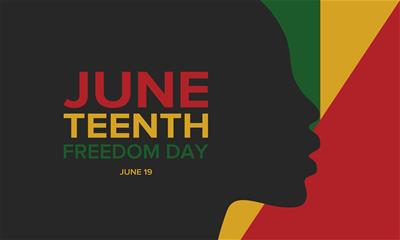
“The historical legacy of Juneteenth shows the value of never giving up hope in uncertain times.” – National Museum of African American History & Culture
Today we celebrate Juneteenth, a day commemorating the end of slavery in the American South. On June 19, 1865, enslaved people in Texas were finally informed that the Civil War was over and they were legally free. Because Texas was the most remote of slave states and had remained under Confederate control, Black people in that state remained enslaved more than two years after the Emancipation Proclamation was issued.
June 19 celebrations began in 1866 and gradually spread across the country. The date has long been marked by African American communities but largely ignored by the rest of America. Judging from current Juneteenth references on all kinds of media outlets, today that will be less true as Americans continue to process many recent wake-up calls for racial equity.
Our hope for this day is that it will be an inspiration to stand up even taller for human freedom and racial equity, and a time for learning more about our country’s history. Resources from the National Museum of African American History & Culture are a good place to start.
In the News this Week

This week several notable events brought good news and new hope for the communities we serve. Here’s a quick rundown:
Supreme Court Sides with Human Rights
Protecting LGBTQ People from Employment Discrimination
This week the Supreme Court issued two long-awaited decisions that affect many of our members, staff and allies. On Monday, the Court ruled that civil rights law protects LGBTQ workers. “An employer who fires an individual merely for being gay or transgender defies the law,” said Justice Neil Gorsuch in issuing the 6-to-3 ruling.
This is the right decision and a victory for human rights. In fact, the Court’s decision appears to be in line with the beliefs of most Americans. A recent poll found that a large majority of Americans recognize that transgender people face discrimination, and 82% said that gay and lesbian people should have civil rights protections.
DACA: Disallowing an “Arbitrary and Capricious” Termination
On Thursday, the Court issued a decision on DACA, Deferred Action for Childhood Arrivals, ruling that the Department of Homeland Security’s decision to rescind DACA was “arbitrary and capricious.” DACA defers deportation action and allows a work permit for qualified undocumented immigrants who were brought to the U.S. as children. As with LGBTQ rights, many surveys have shown that the majority of Americans support DACA and the roughly 650,000 young people who make a strong contribution to our economy.
.jpg?sfvrsn=98149ad9_1)
It has been a tense, uncertain time for DACA recipients as they awaited the Supreme Court’s decision, and the uncertainty isn’t over, as more legal action is sure to come. For now, we are celebrating a decision that delays what would be a tragic and economically damaging deportation of the young people known as Dreamers.
John Herrera, Self-Help’s Senior VP of Hispanic/Latino Affairs, has the following comments:
“During the midst of a pandemic, the Supreme Court’s ruling on DACA brings relief of another kind. It relieves at least 650,000 young people—who didn’t come here on their own—from daily fear of deportation. It allows them to continue contributing to our country in countless ways, as thousands of DACA recipients serve on the front lines of health care and other essential work. Given the current economic and health conditions in the U.S., terminating DACA now would have resulted in senseless tragedies for DACA families and major losses and disruptions in our economy.
For years we have all benefited from the hard work and enormous gifts of DACA recipients. Now we must also allow their parents to come out from the shadows, too. Congress must turn its attention to fixing our immigration system—one that people across the political spectrum agree is broken. Much work remains to make employment and living conditions safe and healthy for all Americans, but for now we are celebrating a just and moral victory that gives us much-needed hope for the future.”
Advocating for Small Businesses that Most Need COVID Relief
Another notable event this week was Congressional testimony presented virtually by our affiliate, the Center for Responsible Lending. The topic was the Payment Protection Program (PPP), the loan relief program provided by the U.S. Small Business Administration (SBA). Forgivable PPP loans have been an important response to small businesses and nonprofits suffering economic losses during COVID-19.
Although the PPP has been a vital source of relief, many questions have been raised about who has received relief, how decisions were made and the terms for receiving loan forgiveness. On June 17, the U.S. House of Representatives’ Committee on Small Business held a hearing on “PPP: Loan Forgiveness & Other Challenges.” Ashley Harrington, Director of Federal Advocacy & Senior Counsel, testified on behalf of CRL.

Ashley Harrington testified before the U.S. House Committee on Small Business.
In her testimony, Ashley discussed COVID’s disproportionate economic impacts and how the structure and execution of the PPP program served to exacerbate racial disparities. Small businesses owned by people of color were already hit hardest by the Great Recession. Today they are more likely to have less capital, fewer employees and less financial cushion for weathering economic losses. However, the financial institutions administering the SBA program have gotten larger fees for larger loans with no guidance or incentives to focus on underserved small businesses.
“We must collectively work to ensure the entrepreneurial spirit of this nation’s businesses owners is fully supported and that support does not fall along the same lines of historical discrimination for communities of color,” said Ashley.
Self-Help is among the mission-focused credit union and banks that do focus our PPP lending on underserved small businesses and nonprofits. As of June 17, Self-Help had lent $171 million in PPP loans to 1,400 recipients. Our lending strongly focuses on small businesses owned by women and people of color, especially those that partner with us in financial services or social justice issues. Our median loan amount is only $27,230, and 59% of loans have gone to companies or organizations headed by people of color. Altogether, Self-Help’s PPP loans have helped maintain over 18,000 jobs.
You can find the latest results on the program and meet some of our borrowers on our website. Our PPP lending will continue through the end of this month when the SBA’s funding for the program is set to expire.